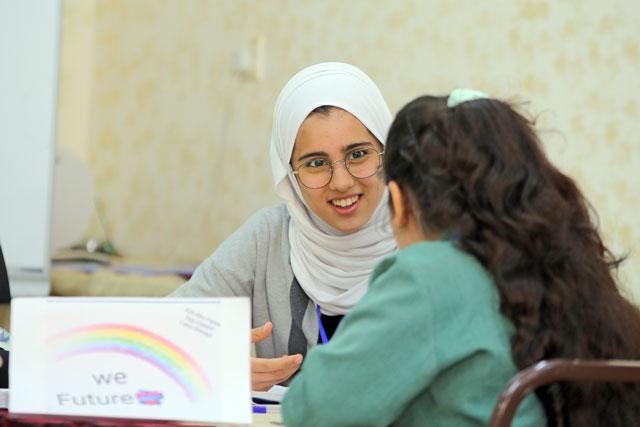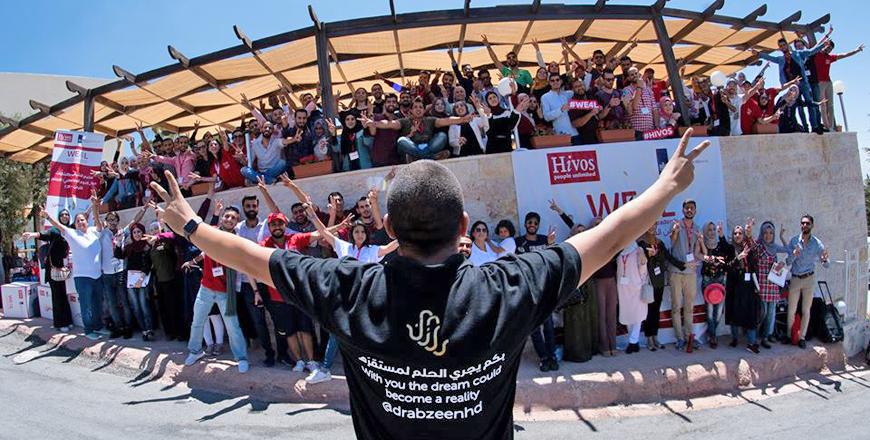You are here
Project employs simulation game to craft 2030 youth vision for Kingdom
By JT - Dec 05,2019 - Last updated at Dec 06,2019

The closing ceremony of the Jordan Youth Vision 2030 project, which was held in Amman on Wednesday (Photo courtesy of the Centre for Development Services)
AMMAN — The civil society consortium Motivators, CRISP and the Centre for Development Services (CDS) on Wednesday hosted the closing ceremony of the Jordan Youth Vision 2030 project in Amman to celebrate its achievements.
The event opened with welcoming speeches by Director of Motivators for Training Bady Baqain, CEO of the Centre for Development Services Ali Mokhtar, Director of CRISP Andreas Muckenfuß and project participants, representative of the German embassy in Amman Bernd Kuzmits and Minister of Political and Parliamentary Affairs and Minister of State Musa Maaytah gave keynote speeches, according to a statement from the CDS.
During ceremony, the participants outlined their achievements over the past months and presented the primary result of the project, the Jordan Youth Vision 2030.
The project’s "innovative approach" lies in the use of informal education tools, particularly the method of simulation gaming, an experienced-based learning tool that was implemented for the first time in the Kingdom.
Together with the participants, project organisers developed the simulation game "Ard El Azm", which is designed to equip members of civil society with skills to recognise the various challenges in their societies and provide practical solutions that could be implemented in real life. The main objective of the game is to develop a Jordanian society that is more cohesive, united and harmonious, according to the statement.
Within the simulation game, players find themselves in the fictitious city of El-MaamouIa (the Desired One in Arabic), where they discuss social challenges of unemployment, poor education and lack of social participation, taking on the roles of local stakeholders and developing inclusive projects in order to find ways to improve their life conditions, the statement said.
The statement noted that the project enabled Jordanian youth to demonstrate their commitment towards local development through social engagement within and beyond their communities, serving as an innovative platform to inspire constructive participation in decision-making processes and empower youth to drive local development through community-based social enterprise.
It is hoped that the developed Youth Vision 2030 will serve as a “point of reference” for key actors from different sectors to join forces and collectively work on positive social change, the statement said.
Taking into account the outcomes of several international youth policy reviews, the organisers continued this dialogue with youth from different governorates through a series of workshops.
The simulation game was implemented in four different governorates and reached more than 100 youth. Afterwards, the results of the simulation games were gathered and eventually formed the Jordan Youth Vision 2030, the statement said.
The youth vision focuses on the most urgent challenges among youth in Jordan, including unemployment, education and participation. The corresponding roadmap, as part of the youth vision, outlines how the youth vision can be realised and describes the objectives to be reached over the coming years to create a more youth-friendly environment, the statement said.
The roadmap employs a cross-sectoral approach and is in line with the Jordan National Youth Strategy 2019-2025 (NYS), said the statement.
The Youth Vision includes stakeholders from various sectors, including business, media and civil society sectors to support the implementation of the NYS until 2025.
Related Articles
AMMAN — The Jordan Hashemite Charity Organisation on Monday began implementing a project for women and youth economic recovery through inten
AMMAN — Students at Sukaina Bint Al Hussein Secondary School in Zarqa are passionate about media and information literacy (MIL).
AMMAN — Offering Jordan’s youth a steady hand to hold onto during difficult times was the vision Anas Alrawashdeh wanted to achieve when he


















